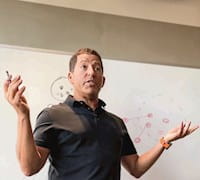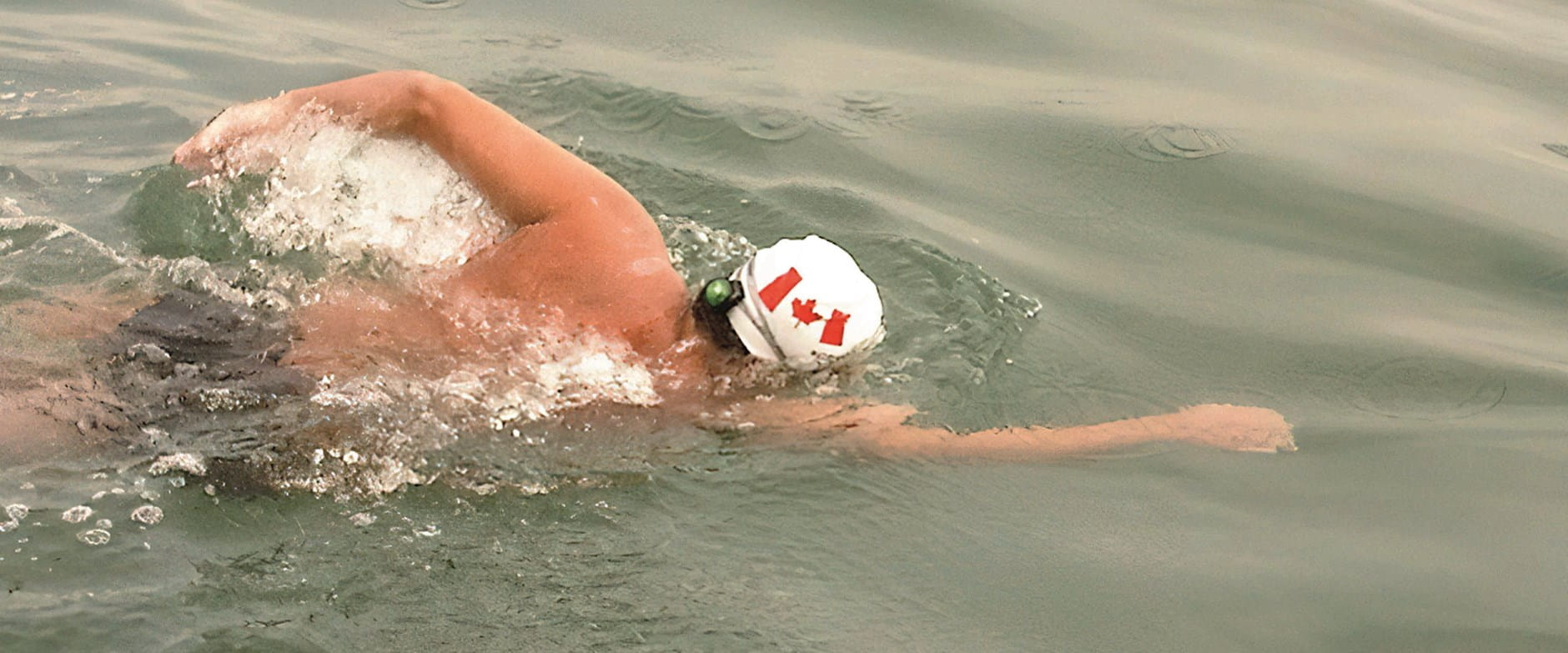Jordan Waxman, ’94, started swimming around midnight, guided through the darkness by the light of a small boat. He followed it for hours, until finally a gray dawn revealed the choppy waters of the English Channel, the 21-mile-wide waterway separating England and France and one of the most difficult challenges in open-water swimming. No wetsuits are allowed for a swim that takes, on average, 12 hours in often sub-60-degree salt water. It’s a 21-mile swim if you get to take a straight line—which given the wide variations in wind, rain, fog, and current, is hardly guaranteed.
He finally had the French shore in sight when the tide literally turned against him.
“I was within a mile of shore, and I swam in place for three hours,” Waxman says. After his support boat fished him out of the water, however, there was no question of giving up. He was already planning his return. He returned a year later and completed it in 14 hours, 9 minutes.

“I am always pushing my limits—whether it’s in my studies or my career, I always feel like there is more I could do. What’s one day of pain in a whole life?”
— Jordan Waxman, ’94
At the time, Waxman was a champion of marathon swimming, an endurance sport in which athletes swim open-water distances of at least 10 kilometers (6.2 miles). He had completed his first major solo swim around the island of Manhattan in 2006, traversing 28.5 miles in eight and a half hours—and in 2014, Waxman swam the 21-mile Catalina Channel near Los Angeles, completing the Triple Crown of Open Water Swimming just after his 50th birthday. Only 291 swimmers have completed the Triple Crown. For context, 4,042 people have summited Mount Everest.
“I am always pushing my limits—whether it’s in my studies or my career, I always feel like there is more I could do,” says Waxman. “What’s one day of pain in a whole life?” Waxman has applied that disciplined, daring mentality to everything he does. Nowadays, he’s committed to helping the next generation accomplish great things. As a managing partner of New York–based Nucleus Advisors, he helps manage assets of nearly $3 billion. Waxman was recently named by Forbes as one of America’s top 50 private wealth advisors, and Nucleus is ranked No. 5 in the country.
“Jordan is uniquely able to be with himself and others in the moment,” says fellow alumnus, good friend, and Nucleus CEO Greg Thorson, ’94. “That’s what has enabled him to learn multiple languages, master multiple sports, and lead multiple businesses.”
Thorson and Waxman use the word “withness” to define a spirit of connection and consciousness that they try to embody. Waxman’s disciplined mentality and ability to sense what’s going on around him have been valuable both in the water and throughout his career thus far.
Now living in Boca Raton, Florida, he recently returned to school at the University of Miami to complete a master’s degree in entertainment, arts, and sports law. He did it over Zoom while working full time, and wrote a 50-page thesis to graduate. With that under his belt, he was ready to launch a new company to advise artists and athletes in transitioning to Web 3.0, employing artificial intelligence and blockchain technology to better connect with fans.
Waxman applies his love of and belief in lifelong learning to himself constantly. He plays the drums, can speak three languages, and has not one but two law degrees from McGill University’s Faculty of Law. He and his wife, Caren, dug deep into child development, particularly into developing emotional recognition in individuals with autism, in order to raise their children to the best of their ability.
“Swimming gave me a sense of freedom, but more importantly, a conviction about life—that inside each of us is a need for meaning and fulfillment,” says Waxman. “I have the opportunity to consciously decide to commit to what can truly make a difference, and let go of what might not.” In recent years, Waxman has endowed several scholarships at higher-ed institutions including High Point University in order to support the next generation of leaders.
No matter what challenges arise, he always has the English Channel to think back on to give him fortitude. “It proves you can expand your boundaries,” he says. “And the next time you do something hard, you go, ‘Well, it’s certainly not as hard as that.’”


